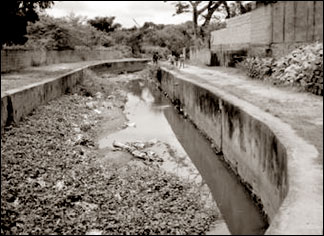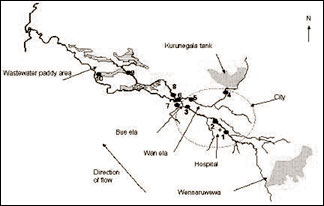Wastewater agriculture - only choice of water?
By Nilma Dole
Globally, using wastewater for agriculture is now seen as a solution
to the water crisis. From Asia to Africa and even Latin America, this
practise is becoming commonplace as many people have no other choice but
to adapt to conditions of development, industrialisation and
urbanisation. Hence, the water we use will also follow that pattern.
|

Water canal in Kurunegala |
In Sri Lanka, Kurunegala is now the pilot of the 'wastewater
agriculture' model. It is interesting to note that the National Water
Supply and Drainage Board is working together with IWMI (International
Water Management Institute) to help facilitate such a community says
Priyanka Dissanayake, IWMI Environmental Specialist. "We are currently
working with the Water Board to offer a proper wastewater treatment
solution to the low-income communities that depend on the wastewater
released from the Kurunegala Teaching Hospital for agriculture".
In lieu of this, an integrated water resources management (IWRM) plan
should be implemented.
This is a problem-solving approach that meets key water challenges in
ways that are economically efficient, socially equitable and
environmentally sustainable, through wastewater checking practises,
checking of microbial contamination, checking of wastewater parasites,
methods on-farm methods and post-harvest activities, wastewater
irrigation practises, checking of heavy metal presence and checking if a
natural treatment policy can be adopted.
 More aspects pertaining to this were highlighted at the Wastewater
Agriculture and Sanitation Poverty Alleviation Workshop (WASPA) conduct
recently. Expert Alexandra Clemett stated "An integrated preventive
management framework for public health and environmental benefits of
wastewater use should be implemented according to WHO guidelines". More aspects pertaining to this were highlighted at the Wastewater
Agriculture and Sanitation Poverty Alleviation Workshop (WASPA) conduct
recently. Expert Alexandra Clemett stated "An integrated preventive
management framework for public health and environmental benefits of
wastewater use should be implemented according to WHO guidelines".
The water canal in Kurunegala has two basins - the Kurunegala tank
and the Wennaruwewa tank. However, as time went by, the former
irrigation canal to the village turned into the present sewer from the
town. This water flows from these basins via the canal and into the
villages of Buela and Wanela. The farmers working on the paddy fields
closer to these places have no choice but to use that polluted water.
It is vital to point out that wastewater does have side effects
especially if it is filled with contaminants and pathogens that will
possibly cause infection. Proper separation of solid from liquid and
treatment of water should be done at the source. The use of polluted
water sources without efficient safeguard measures raise health risks
for farmers and consumers while actual risks depend on many factors like
the living conditions of the exposed population.
Even in neighbouring India, the 'Hyderabad Declaration on Wastewater
use in agriculture' offers an intricate mix of possible benefits and
risks associated with wastewater use in agriculture for a balanced
methodology by researchers and water experts. As clean water is
increasingly becoming scarce and if proper wastewater treatment can be
done to dirty water, 'wastewater agriculture' will be the only choice in
the future. |
